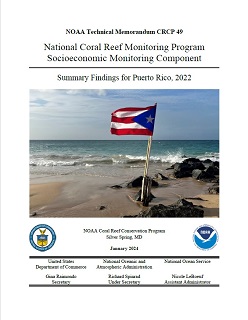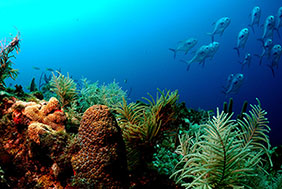-
Home
-
Data & Publications
-
Regional Portals
- About Regional Portals
- Florida
- Navassa Island
- Puerto Rico
- Flower Garden Banks
- U.S. Virgin Islands
- American Samoa
- Commonwealth of the Northern Mariana Islands
- Federated States of Micronesia
- Guam
- Main Hawaiian Islands
- Republic of the Marshall Islands
- Northwestern Hawaiian Islands
- Republic of Palau
- Pacific Remote Island Areas
-
CRCP Activities
- Glossary
National Coral Reef Monitoring Program Socioeconomic Monitoring Component: Summary Findings for Puerto Rico, 2022

The Socioeconomic Component of the National Coral Reef Monitoring Program (NCRMP) gathers and monitors a collection of socioeconomic data in seven U.S. coral jurisdictions. The team continued its second monitoring cycle with data collection in Puerto Rico in 2022, and recently released their report of summary findings along with two new infographics. The report outlines current human dimensions information relevant to coral reef resources in Puerto Rico, as well as trends between the first (2015) and second monitoring cycles (2022), The report is accompanied by an infographic for the 2022 findings and a second infographic for the trends. Results are representative of the resident population of Puerto Rico as a whole, as well as strata for the coastal north, inland, and coastal south regions.
Household surveys conducted in January to November of 2022 revealed that Puerto Rico residents were familiar with a variety of threats to coral reefs and generally supported a range of potential marine management policies and regulations, such as stricter control of pollution sources, increasing law enforcement, and implementing new requirements for improved wastewater treatment. Residents also supported the creation of new marine protected areas and generally believed they have led to a range of improved benefits for coral reefs and coastal communities.There was a general consensus that Puerto Rico's coral reefs are important to culture, coastal protection, seafood, tourism, fisheries, and local livelihoods for coastal communities. Residents perceived ocean water quality, the amount of live coral, diversity of live coral, amount of fish, and diversity of fish as being in bad condition, and they believed that these conditions will worsen. Additionally, most resident households consumed seafood in some of their meals or more, and almost half of those residents ate seafood from local coral reefs throughout the year. Surveys also showed that swimming/wading and beach recreation were primary activities for Puerto Rico residents in both 2015 and 2022, but frequency of participation in all activities declined in 2022.
Overall, the results indicate that Puerto Rico residents have important human connections to coral reefs and rely on these ecosystems for a variety of cultural and socioeconomic benefits. Results also suggest that residents want to see efforts to mitigate threats (e.g., pollution) to coral reefs and prevent resource conditions (e.g., ocean water quality, amount of live coral) from becoming worse. Targeted outreach, particularly about ocean acidification, coral disease, and bleaching, could help increase awareness of threats to coral reefs, how those threats how those threats are linked to sustained benefits and quality of life, and what people can do to help conserve coral reefs.
Citation: M.E. Allen, C.S. Fleming, A. Alva, S.B. Gonyo, S.D. Regan, and E.K. Towle. 2024. National Coral Reef Monitoring Program Socioeconomic Monitoring Component: Summary Findings for Puerto Rico, 2022. U.S. Dep. Commerce, NOAA Tech. Memo., NOAA-TM-NOS-CRCP-49, 42p. + Appendices. DOI: 10.25923/893p-7f36.
Download Products
- Summary Findings for Puerto Rico, 2022 - Full Report
- Takeaways from the Puerto Rico 2022 Survey - Infographic (English)
- Takeaways from the Puerto Rico 2022 Survey - Infographic (Spanish)
- Trends from Socioeconomic Surveying in Puerto Rico - Infographic (English)
- Trends from Socioeconomic Surveying in Puerto Rico - Infographic (Spanish)
Related project information
- National Coral Reef Monitoring Program: Understanding Socioeconomic Connections
- National Coral Reef Monitoring Program: Puerto Rico Infographics


